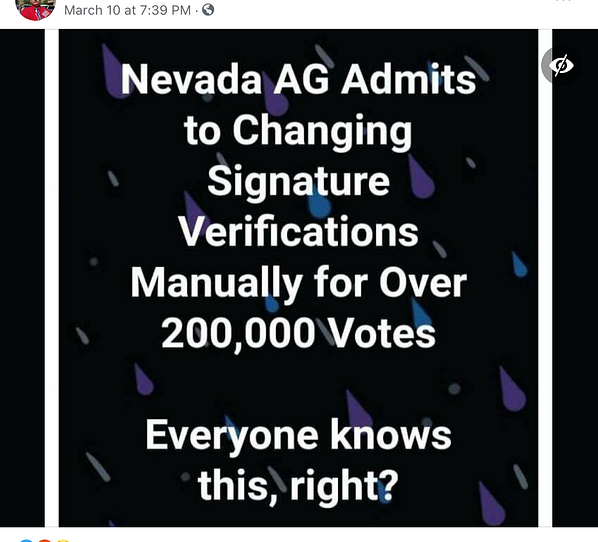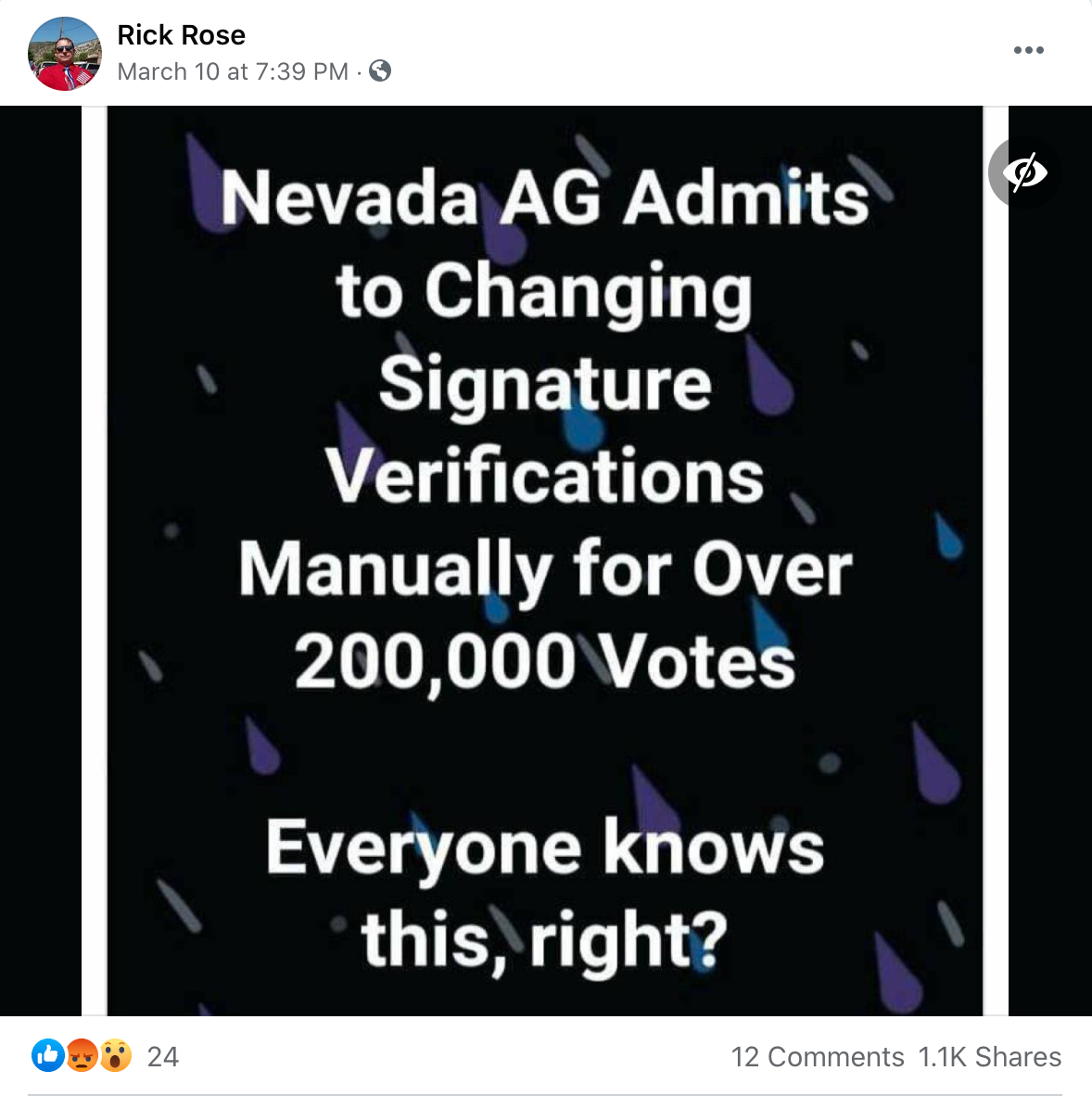Did the Nevada Attorney General Admit to ‘Changing Signature Verifications’?

Months into Joe Biden’s presidency, viral allegations of voter fraud in the 2020 election continue to spread on social media. A widely shared Facebook post, for example, is claiming that Nevada’s attorney general admitted to “changing signature verifications” for more than 200,000 votes.

This is a false claim. Attorney General of Nevada Aaron Ford did not change signature verifications manually on more than 200,000 ballots.
The Facebook post, which does not link to a source, mimics a headline that appeared on an article at a site called Fellow American Daily: “Nevada AG Admits That They Changed Signature Verification Manually for Over 200,000 Votes.”
That article was based on a November 2020 Fox News interview with former Republican Nevada Attorney General Adam Laxalt, who served as attorney general of Nevada from 2015-2019. Laxalt, who was out of office at the time of the election and the Fox News interview, claimed the voting system was “insecure,” and that there were “200,000 votes that were verified by machine only.” The article correctly refers to Laxalt as a former official but the headline does not. Further, Laxalt’s claims that the voting system in Nevada was “insecure” and that “200,000 votes” were only verified by machine, and not a human, are unfounded.
During the interview Laxalt detailed what he claimed to be instances of voter fraud: “We have over 600,000 mail-in ballots that have been counted, those are votes that are official in our system,” he said. “We also know that we have unclean rolls, ballots that have been mailed to dead people, to people who have moved out of the state. … The situation we have here is that 200,000 of those votes have been verified by a machine only and we’ve spoken to AI and computer vision experts on this and they have told us that the registrar reduced the signature verification standard to 40%.” Laxalt continued by saying that “no human being went back to check” the 200,000 ballots in question.
The Fellow American Daily story summarizes Laxalt’s point about reducing the signature verification standard.“The people who are responsible for controlling these machines that read the voting signatures turned down the settings so that more ballot signatures could be accepted.” There is no evidence to support this claim, nor the claim in the headline that signature verifications were changed.
According to the Nevada secretary of state’s office, “[S]ignature verification is performed on every ballot received. If the signature is missing or if the signature on the ballot return envelope does not match the signature on file for the voter, the ballot will not be counted until the voter verifies their signature.”
The Nevada secretary of state’s office explained the signature verification process as follows, detailing that the process does in fact involve a human: “The county reaches out to the person to make sure all the information they included on their voter registration was correct. Small typos, data entry errors, and sloppy handwriting can prevent the county from being able to authenticate the record. Similarly, bogus or fabricated information will prevent the local election official from authenticating the information provided. These voters are put in ‘active pending’ status and are not allowed to vote until the information concerning their registration can be confirmed or they appear to vote in person and provide photo identification and proof of residency.”
Monica Moazez, a spokesperson from the Nevada attorney general’s office told The Dispatch Fact Check via email that “there is no truth to this claim.”
Moazez says Ford stands by his previous conclusions “there has been no evidence of widespread voter fraud in Nevada and that our elections were fair and secure. This has been demonstrated time and time again and across numerous courts.”
As outlined in a “Facts vs Myths” page on the secretary of state’s website, addressing claims about the Nevada 2020 “post-General Election,” the secretary of sState’s office has said that they haven’t seen any evidence of widespread voter fraud. “We do investigate valid voter fraud complaints. Along with state and local law enforcement, we have a team of experienced criminal investigators available to our Elections Division.” The Secretary of State’s office said. “While we are pursuing action in a number of isolated cases, we have yet to see any evidence of wide-spread fraud.”
If you have a claim you would like to see us fact check, please send us an email at factcheck@thedispatch.com. If you would like to suggest a correction to this piece or any other Dispatch article, please email corrections@thedispatch.com.